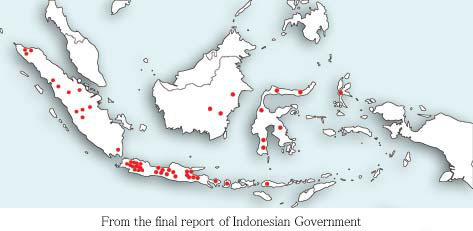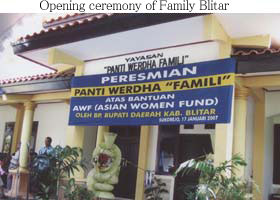 |
Projects by country or region - Indonesia |
|
  |
|
|
|
|
Country or Region |
Period for Applications & Project Implementation |
Project Description |
|
Indonesia |
1997.3.25`2007.3 |
Assistance in developing welfare facilities for the elderly
(valued at 380 million yen) |
|
|
Background |
The peace treaty between Japan and Indonesia as well as agreement on reparations were concluded in 1958. Reparation issue was solved.
The comfort women issue began receiving considerable attention in Indonesia in 1992, and it was in that year that women first came forward. The Lembage Butun Hukum Yogjakarta (LBH), or Legal Aid Institute, began registering them in 1993. Later, in 1995, the Communication Forum of the Ex-Indonesian Heiho also began registering former comfort women. A very large number of women were registered. In addition to former comfort women, among those registered were women who had been raped or severely mistreated in other ways.
After the Japanese Government had conferred with the Government of that country, the Minister of Social Affairs Ign Soewignjo announced on 14 November 1996 that the Indonesian Government's position on the comfort women issue was as follows:
For the people of Indonesia, the comfort women issue represents a dark, unforgettable side of their history, and it is important that every effort be made to learn from this lesson to prevent such an occurrence from ever happening again.
The Government empathizes with the endless psychological and physical trauma and pain of the women who were victims of violence.
However, the Government, representing a people imbued with the Panchasila philosophy, does not intend to introduce measures or policies strongly colored by emotion, and will work hard to protect the honor of women who were victimized and their families.
The Government of Indonesia is of the understanding that the question of war reparations, material restitution and the right to claim from the Japanese Government was settled by two accords signed in 1958 -- the Treaty of Peace Between Japan and the Republic of Indonesia, and the Reparations Agreement Between Japan and the Republic of Indonesia.
In Indonesia, the Asian Women's Fund should promote projects and assistance programs related to the comfort women issue through the Indonesian Government (primarily through the Department of Social Affairs), not through any other organization or individual.
|
Based on this position, the Indonesian Government expressed a desire for assistance in developing welfare facilities for the elderly, rather than for projects benefiting individual former comfort women. This conclusion was reached primarily because: (i) it would be extremely difficult to authenticate former comfort women; (ii) it was important to protect the honor of the former comfort women and their families; and (iii) the question of war reparations from Japan to Indonesia had already been settled by accords, specifically the Treaty of Peace.
In December 1996, this decision was explained to visiting Fund executives by high-ranking officials in Indonesia's Department of Social Affairs and the office of the State Minister for the role of women. Some Fund members expressed a strongly held opinion that atonement money should be provided to individual former comfort women, but the Fund eventually agreed, consenting to decisions taken by both countries' governments. As a result, 50 facilities to be built within 10-year period in the regions where former "wartime comfort women" are believed to be stationed.
|
|
|
|
Project implementation |
|
The Fund requested that former comfort women should be given priority when admitting people to the facilities, and that areas where the victimization of comfort women had occurred should be given priority when selecting locations for those facilities. The Fund received the Indonesian Government's commitment that former comfort women who had come forward would be given priority when selecting residents of the facilities to be constructed under the projects. Also, the facilities would mainly be organized in those areas where many comfort women were thought to have been living.
On 21 March 1997 Prime Minister Hashimoto sent a letter of apology regarding the Comfort Women issue to the Pressident of Indonesia Suharto.
On 25 March 1997, a Memorandum of Understanding was signed by the Indonesian Department of Social Affairs and the Asian Women's Fund(Full Text ), and the projects began. The Department was designated as the organization implementing the projects, and it was agreed that the Asian Women's Fund would offer a total of 380 million yen as assistance over a 10-year period, taken from financial resources of the Japanese Government. ), and the projects began. The Department was designated as the organization implementing the projects, and it was agreed that the Asian Women's Fund would offer a total of 380 million yen as assistance over a 10-year period, taken from financial resources of the Japanese Government.
The project ran as follows: A total of 69 facilities were built. In the first period of the project, five facilities were built; the second, six; the third and forth, ten; the fifth and sixth, 21; and the seventh, 27. According to the final report of Indonesia's Ministry of Social Affairs, there are currently 235 welfare facilities for senior citizens nationwide. Two of them are managed by the central government and 71 by provincial governments. The remainder are run by private organizations. Twenty-nine percent of all facilities include the buildings constructed by the Fund. The facilities are distributed across the country. Almost all facilities were built to expand existing welfare facilities for senior citizens. In certain cases, however, the building built under the Fund's project is the only building at the facility. The facility established by the foundation in Blitar known as the "Family" in the final fiscal year of the Fund is a facility that houses 14 former comfort women.
|
 |
Support organizations of the comfort women as victims in Indonesia were critical to the atonement project in which the Fund carried out the construction of welfare facilities for senior citizens. They requested that the project should target each individual victim. However, the project was based on a Memorandum of Understanding between the Indonesian government and the Fund. The Fund alone could not change it. Senator Nourshabani finally decided after a long talk with the Fund to establish welfare facilities for general senior citizens where the former comfort women could move in should they wish to do so. The Ministry of Social Affairs approved and supported the construction of three facilities in Bangung, Cimahi and Pasuruan. out the construction of welfare facilities for senior citizens. They requested that the project should target each individual victim. However, the project was based on a Memorandum of Understanding between the Indonesian government and the Fund. The Fund alone could not change it. Senator Nourshabani finally decided after a long talk with the Fund to establish welfare facilities for general senior citizens where the former comfort women could move in should they wish to do so. The Ministry of Social Affairs approved and supported the construction of three facilities in Bangung, Cimahi and Pasuruan.
The Fund has promoted observation tours of the facilities to the best of its ability. It was able to visit 41 of the 69 facilities. All of the new buildings have a positive environment and are well maintained. Senior residents who experienced life under Japanese occupation are now living comfortably in those buildings. Once a person becomes a resident he/she can live in the facility for the rest of his/her life. The facilities have burial grounds for residents who have passed away.
In January 2007, the Ministry of Social Affairs presented a final report of the project of the AWF in Indonesia. (Full text ) )
|
|
|
|
|
  |
|
|

